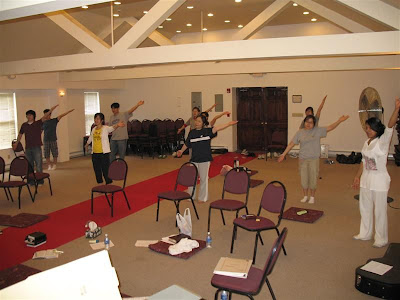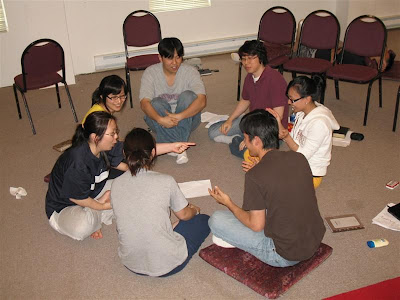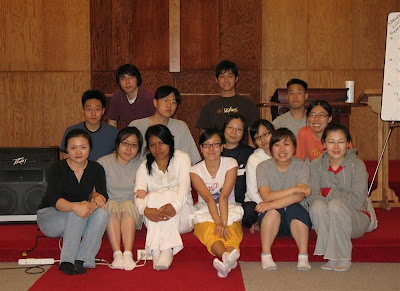"How often they rebelled against him in the desert and grieved him in the wasteland! Again and again they put God to the test; they vexed the Holy One of Israel."
(Ps 78:40-41)
The KJV employs another word for "vexed": LIMITED.
The Israelites limited God by their unbelief. Despite all that God had done to demonstrate His saving & provisional powers, they stubbornly refused to believe in Him.
Unbelief ends all faith. Faith begins at the end... at the end of our strength.
George Mueller said "faith does not operate in the realm of the possible. There is no glory for God in that which is humanly possible. Faith begins where man's power ends."
God repeatedly brought the children of Israel to a place of "dead end" where they had no choice but to seek God for deliverance. Instead of realizing God who provides and saves, they continued to test God saying, "Is God among us or not?"
You may wonder why God has to drive us to the point of helplessness and dire need. It is because it is there that God's power can be demonstrated on our behalf.
Faith & Unbelief both astonished Jesus.
Jesus was astonished at the great faith of the centurion who came to Jesus for his servant's healing. He was also astonished at the people of his hometown of Nazareth, and could not perform many miracles there because of their unbelief.
Our unbelief limits God. It keeps Him from displaying His great power and demonstrating His faithfulness in our lives.
But when we begin to truly believe, when we can thank God before we cross the impassable Red Sea, we will come to realize that what God can and will do on behalf of those who trusts Him is limitless.
Are you limiting God in your life by saying, "It is impossible?"
Let God be God.
Faith is to believe what we do not see; and the reward of faith is to see what we believe. (Augustine)
--from Nakwon EM 6/24 Sunday Worship Service
Sunday, June 24, 2007
Sunday, June 17, 2007
soul dissatisfaction: missing the heart of God
We were made for soul satisfaction, so we cannot live with chronically dissatisfied souls for long. It we do not find satisfaction in God's goodness to us, we will look for satisfaction someplace else. (John Ortberg)
There are many reasons for soul dissatisfaction. But one of the main reason is pride.
Not just any pride or arrogance, but;
The older brother in the parable of the prodigal son, a valiant commander of the Aramian Army named Naaman, and the rich young ruler who came to Jesus asking how he can obtain eternal life exemplify these three kinds of pride that causes us to miss the very heart of God.
All three appear to have their hearts in the right place, but all missed the heart of God because of soul dissatisfaction. The older son was "obedient" to the father; Naaman came to God of Israel for healing; and the rich young ruler, despite all he possessed, knew he did not possess what mattered the most--eternal life.
The error of the older son is that he failed to know his father's heart by assuming he knew it all. He was the obedient, good son. And yet how sad to see his father pleading with him because he can't stand to witness his father's amazing mercy to his returning younger brother. We want mercy for ourselves, but judgment for others...
From this parable, we can see that both sons were soul dissatisfied. Just because we attend church and all the meetings, does not guarantee we are soul satisfied. It is within a relationship with God that we will find satisfaction for our souls.
Naaman expected Prophet Elisha to perform some amazing, tangible ritual to heal him of his leprosy, but instead was told by a messenger to do something seemingly absurd. Hence, his first reaction was of anger, just like the older brother in the parable.
Our pride in our theology - i.e., our understanding of how God should work - often gets in the way and is one of the major signs of our soul dissatisfaction. Remember the story of Jim Elliot and his four companions who were killed during their mission service in Ecuador. Their deaths seem in vain and horrible, and you can argue God could have used these dedicated young men for His service in far more powerful ways, but because of their martyrdom, youths all over the world were ignited and inspired for mission.
God does not work in the way we deem appropriate or ideal, for His ways and thoughts are infinitely higher than ours.
The rich young ruler was not denied eternal life because he was wealthy, but because he was self-sufficient. He did not "need" God as he claimed. That he could not let of his wealth and possession betrayed his holding on to self-sufficiency.
As Oswald Chambers said, if you are going to ask God, be sure you first need Him.
Blessed are the paupers in the spirit, theirs is the kingdom of heaven...
--from Nakwon EM June 17th Sunday Worship Service
There are many reasons for soul dissatisfaction. But one of the main reason is pride.
Not just any pride or arrogance, but;
Pride through Experience.
Pride in Theology.
Pride in Self-sufficiency.
The older brother in the parable of the prodigal son, a valiant commander of the Aramian Army named Naaman, and the rich young ruler who came to Jesus asking how he can obtain eternal life exemplify these three kinds of pride that causes us to miss the very heart of God.
All three appear to have their hearts in the right place, but all missed the heart of God because of soul dissatisfaction. The older son was "obedient" to the father; Naaman came to God of Israel for healing; and the rich young ruler, despite all he possessed, knew he did not possess what mattered the most--eternal life.
The error of the older son is that he failed to know his father's heart by assuming he knew it all. He was the obedient, good son. And yet how sad to see his father pleading with him because he can't stand to witness his father's amazing mercy to his returning younger brother. We want mercy for ourselves, but judgment for others...
From this parable, we can see that both sons were soul dissatisfied. Just because we attend church and all the meetings, does not guarantee we are soul satisfied. It is within a relationship with God that we will find satisfaction for our souls.
Naaman expected Prophet Elisha to perform some amazing, tangible ritual to heal him of his leprosy, but instead was told by a messenger to do something seemingly absurd. Hence, his first reaction was of anger, just like the older brother in the parable.
Our pride in our theology - i.e., our understanding of how God should work - often gets in the way and is one of the major signs of our soul dissatisfaction. Remember the story of Jim Elliot and his four companions who were killed during their mission service in Ecuador. Their deaths seem in vain and horrible, and you can argue God could have used these dedicated young men for His service in far more powerful ways, but because of their martyrdom, youths all over the world were ignited and inspired for mission.
God does not work in the way we deem appropriate or ideal, for His ways and thoughts are infinitely higher than ours.
The rich young ruler was not denied eternal life because he was wealthy, but because he was self-sufficient. He did not "need" God as he claimed. That he could not let of his wealth and possession betrayed his holding on to self-sufficiency.
As Oswald Chambers said, if you are going to ask God, be sure you first need Him.
Blessed are the paupers in the spirit, theirs is the kingdom of heaven...
--from Nakwon EM June 17th Sunday Worship Service
Monday, June 11, 2007
Retreat Pictures

Is Ray bending down?

"My Savior loves me. He died to save me..."

Corny Games

Yum...ramen at 12AM

Group Picture
I have only posted 5 out of 122 pictures we took.
If you want to see all of the pics, click here.
If you want me to send you a zipped folder of all of these pictures, I will do it only if you email me at tobibobes@gmail.com and I will need a response by Wednesday (6/13) 8 PM.
This is so I will not have to keep on resending it via email to every person who asks (the attachment will about 7 MB) and I can just cc everyone when I send it all at once.
glory in the mountaintop...
Glory in the Mountaintop & Demon in the Valley
In Matthew 17:1-8, Jesus takes Peter, James & John up a high mountain and shows His heavenly glory.
He transfigured ("metamorphosis") before them and appeared as bright as light speaking with Moses and Elijah.
Moses, the lawgiver and Elijah, the prophet symbolized the quintessential "Law and the Prophets" (i.e., the OT as we know it).
With Jesus in their company, their meeting symbolized perfect salvation plan of God, the coming together of fulfillment of all things.
In a moment of awe and trepidation, Peter blurts out his desire to remain in this place of indescribable glory and offers to build three shelters for Jesus, Moses & Elijah.
But "while he was still speaking," it says, God speaks.
This "mountaintop experience" was marked indelibly in Peter's mind as we can see from his confession in his letter towards the end of his life:
The danger that Peter and everyone else who have had such glorious experience of God's presence - a revelation of His goodness, faithfulness and love - face is the desire to remain there up on the mountain, away from the drab, mundane, often troublesome valley of reality below.
Mountaintop experience is not the place we are called to remain in comfort and contentment. If we do, we risk spiritual stagnation.
Any stagnant, stale water without inlet and outlet for water flow is fertile breeding ground for pestilent insects like the mosquitoes.
We become perfect breeding ground for Satan to plague our souls and destroy the work of God in our lives.
If we do not come down the mountain to the valley below, we become spiritually stagnant, wanting to go from one height of experience to another - hopping between mountain peaks, never wanting to touch the valley below. But the real Christian walk is done in the valley of the demon possessed.
Jesus and his three disciples descend the mountain to find a father with a demon-possessed boy.
Jesus drives out the demon and the boy is saved.
If Peter and the others had stayed up on the mountaintop, they would never have seen Jesus at work.
It is true for us.
If we try to remain up on the mountaintop of spiritual "highs," we will never witness Jesus at work in our lives and others. In fact, we will never truly grow and mature.
Mountaintop experience is always followed by the valley of the demon-possessed.
The retreat we have just had this weekend marked the beginning of or the point of encouragement for our spiritual walk. We are not called to go from one experience to another, but to live our lives in the valley of every day life and walk with the Spirit.
And it is here in the depth of the valley that we taste and see that the Lord is good.
--from Nakwon EM June 10th Sunday Worship Service
In Matthew 17:1-8, Jesus takes Peter, James & John up a high mountain and shows His heavenly glory.
He transfigured ("metamorphosis") before them and appeared as bright as light speaking with Moses and Elijah.
Moses, the lawgiver and Elijah, the prophet symbolized the quintessential "Law and the Prophets" (i.e., the OT as we know it).
With Jesus in their company, their meeting symbolized perfect salvation plan of God, the coming together of fulfillment of all things.
In a moment of awe and trepidation, Peter blurts out his desire to remain in this place of indescribable glory and offers to build three shelters for Jesus, Moses & Elijah.
But "while he was still speaking," it says, God speaks.
This "mountaintop experience" was marked indelibly in Peter's mind as we can see from his confession in his letter towards the end of his life:
We did not follow cleverly invented stories when we told you about the power and coming of our Lord Jesus Christ, but we were eyewitnesses of his majesty. For he received honor and glory from God the Father when the voice came to him from the Majestic Glory, saying, "This is my Son, whom I love; with him I am well pleased." We ourselves heard this voice that came from heaven when we were with him on the sacred mountain. (2 Peter 1:16-18)
The danger that Peter and everyone else who have had such glorious experience of God's presence - a revelation of His goodness, faithfulness and love - face is the desire to remain there up on the mountain, away from the drab, mundane, often troublesome valley of reality below.
Mountaintop experience is not the place we are called to remain in comfort and contentment. If we do, we risk spiritual stagnation.
Any stagnant, stale water without inlet and outlet for water flow is fertile breeding ground for pestilent insects like the mosquitoes.
We become perfect breeding ground for Satan to plague our souls and destroy the work of God in our lives.
If we do not come down the mountain to the valley below, we become spiritually stagnant, wanting to go from one height of experience to another - hopping between mountain peaks, never wanting to touch the valley below. But the real Christian walk is done in the valley of the demon possessed.
Jesus and his three disciples descend the mountain to find a father with a demon-possessed boy.
Jesus drives out the demon and the boy is saved.
If Peter and the others had stayed up on the mountaintop, they would never have seen Jesus at work.
It is true for us.
If we try to remain up on the mountaintop of spiritual "highs," we will never witness Jesus at work in our lives and others. In fact, we will never truly grow and mature.
Mountaintop experience is always followed by the valley of the demon-possessed.
The retreat we have just had this weekend marked the beginning of or the point of encouragement for our spiritual walk. We are not called to go from one experience to another, but to live our lives in the valley of every day life and walk with the Spirit.
And it is here in the depth of the valley that we taste and see that the Lord is good.
--from Nakwon EM June 10th Sunday Worship Service
Monday, June 04, 2007
following Jesus a a distance
How would you characterize your devotion to Jesus?
How far are you willing to go with Him? Have you put a "limit" on how devoted you would be to Him?
Despite having walked with the Son of God for three and a half years, having witnessed awesome miracles, having heard heart-convicting truths, having seen the great crowds that gathered about his Master, Peter, one of Jesus' three closest disciples, denied Jesus at a crucial moment.
To chalk it up to cowardice is oversimplification.
Yes, he was afraid, but the fear began long before the accusers gathered about him.
In Matthew 26, Peter is seen following Jesus after his capture.
All other disciples (except John) had fled and was nowhere near the vicinity of this chaos. Peter was the one who swung that sword and cut off the High Priest's servant Malchus' ear in an attempt to save Jesus.
It was rather brave of Peter to follow Jesus even after his capture, but the problem was how he followed:
Peter followed Jesus.
But at a distance. Or "safe" distance as he probably had thought.
Why did Peter - the man who saw Jesus in his heavenly glory (along with James and John) on the Mount of Transfiguration, the man who had seen Jesus raise Jairus' daughter from the dead, the man whom Jesus entrusted to take with him to prayer at his last hours at Gethsemane - deny the one he confessed was the "Christ, the Son of the Living God"?
Peter followed Jesus at a distance.
He wanted to go with Jesus, but not so far as to risk his own life.
He wanted to be near his Lord and Master but wasn't willing to be identified with Him to the point of forsaking his well being.
Do you follow Jesus at a distance?
Although we may never say we will give God a limited devotion, we live like Peter. Our devotion limited by our fears of losing our lives, our dreams, our hopes, our plans, our future.
Are you like Peter?
When God asks us to give up all, whether it be possessions or pride or future, He does it so that He may take it and purify our intentions, sanctify our hopes and strengthen our resolve and skills so that He can return it to us doublefold and with better end that will glorify Him ultimately.
As you prepare your hearts for the upcoming retreat, think on Peter.
Think about how you would describe your devotion to God.
--from Nakwon EM 6/3 Sunday Worship Service
How far are you willing to go with Him? Have you put a "limit" on how devoted you would be to Him?
Despite having walked with the Son of God for three and a half years, having witnessed awesome miracles, having heard heart-convicting truths, having seen the great crowds that gathered about his Master, Peter, one of Jesus' three closest disciples, denied Jesus at a crucial moment.
To chalk it up to cowardice is oversimplification.
Yes, he was afraid, but the fear began long before the accusers gathered about him.
In Matthew 26, Peter is seen following Jesus after his capture.
All other disciples (except John) had fled and was nowhere near the vicinity of this chaos. Peter was the one who swung that sword and cut off the High Priest's servant Malchus' ear in an attempt to save Jesus.
It was rather brave of Peter to follow Jesus even after his capture, but the problem was how he followed:
Those who had arrested Jesus took him to Caiaphas, the high priest, where the teachers of the law and the elders had assembled. But Peter followed him at a distance, right up to the courtyard of the high priest. He entered and sat down with the guards to see the outcome.
Peter followed Jesus.
But at a distance. Or "safe" distance as he probably had thought.
Why did Peter - the man who saw Jesus in his heavenly glory (along with James and John) on the Mount of Transfiguration, the man who had seen Jesus raise Jairus' daughter from the dead, the man whom Jesus entrusted to take with him to prayer at his last hours at Gethsemane - deny the one he confessed was the "Christ, the Son of the Living God"?
Peter followed Jesus at a distance.
He wanted to go with Jesus, but not so far as to risk his own life.
He wanted to be near his Lord and Master but wasn't willing to be identified with Him to the point of forsaking his well being.
Do you follow Jesus at a distance?
Although we may never say we will give God a limited devotion, we live like Peter. Our devotion limited by our fears of losing our lives, our dreams, our hopes, our plans, our future.
Are you like Peter?
When God asks us to give up all, whether it be possessions or pride or future, He does it so that He may take it and purify our intentions, sanctify our hopes and strengthen our resolve and skills so that He can return it to us doublefold and with better end that will glorify Him ultimately.
As you prepare your hearts for the upcoming retreat, think on Peter.
Think about how you would describe your devotion to God.
--from Nakwon EM 6/3 Sunday Worship Service
Subscribe to:
Posts (Atom)
